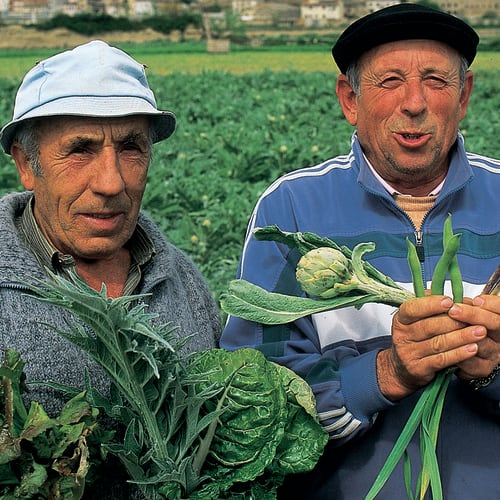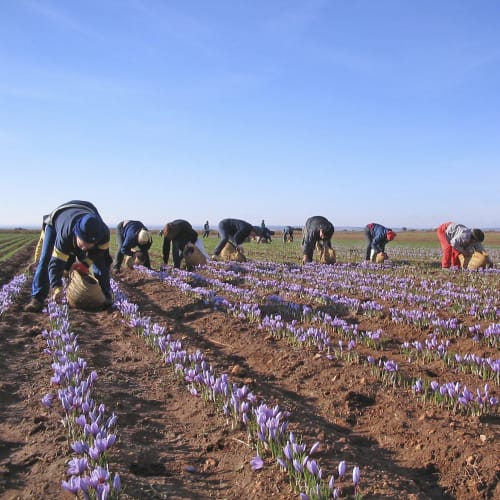Harvest Bounty
November 2010




My family and I have traveled the byways of Spain over the years, and we take great pleasure in getting to know members of Spanish families whose livelihood is intimately linked with the earth. Whether they are churning milk from tended flocks, growing rice or peppers; pruning grape vines or olive trees, there is something basic and straightforward about their lives.
I recall some special moments when visiting Spanish suppliers. I remember my friend Fermín's face as he described with affection his favorite olive tree in whose roots he hid as a child. Another time, our saffron supplier José reflected that he learned to walk behind the plow. I also visited with Pedro, a maestro of Ibérico ham, to view his herd of Ibérico pigs as some of them were wallowing in a puddle next to some holm oaks. Later we enjoyed meeting his young son Jorge who was working as a partner with his father.
I find it refreshing to find people who do not feel all-powerful, but know that their lives are linked to the seasons, not only to their wits. Especially at this time of year, when we can see their preparations for winter, the words of the traditional harvest hymn come to mind: “All is safely gathered in ere the winter storms begin.”

A vivid reminder of this is the message my dear friends Hans and Daida, who have adopted Spain as their home, left on their website. In Cataluña they produce superb artisan olive oils and exquisite olive oil soap wrapped by hand. We count on them without fail, and their products arrive like clockwork. I must admit most of the time we do not give it a second thought, but from Hans's vantage point as a producer, it is not that simple. He wrote:
On the 8th of March 2010 a severe unexpected snowstorm inflicted terrible damage in our county of Empordà... That day we had 16 inches of snowfall, a sticky kind of snow piling up high at sub zero temperatures even on thin electricity wires. At the end of the afternoon sudden gusts of wind made these lumps of ice swing, breaking everything brittle. In the 50 years we've known Catalonia we have never seen such havoc.
But it was the trees that came to bear the most of the suffering. Particularly the evergreens such as pines, holm oaks, cork trees, cypresses and of course olive trees that were more than decimated. On our property, dozens of solitary trees fell like matches, roots pulled and all. Our Arbequina olive trees kept themselves upright but left an estimated 2000 broken main branches, almost one third.
What nature inflicted on this day will take years to repair. Compared to other storms this was a small disaster. It certainly keeps you humble.
As city dwellers in the 21st century, our focus is not on the sweat and toil involved in producing the food we eat, nor the vagaries of weather, although we might read about the wheat shortage due to forest fires in Russia, or this year's short crop of corn in America. We do not give a thought about Hans's crops, or José and María so long as they have toasted enough saffron to meet our needs.
Facing the aftermath of inclement weather which affects the growing season, or not being able to find enough farmhands to bring in the harvest are all abstract concepts for many of us who are able to have more than enough of everything at the click of a mouse.
From the first days when primitive man learned to plant seeds and till the soil, harvest time has been a time of relief and rejoicing for all involved. Autumn marks the culmination of months of hard work in the fields: sowing the seeds; coaxing the young seedlings until they become strong enough to make it on their own; irrigating and tending the crops and finally bringing in the fruit of all that labor. As I write this I realize that I could easily use many of these same words describing those of us who are parents as we shepherd our children through many years of joy and toil, and then enjoy them as they reach adulthood.
Our unique Thanksgiving Day celebration in the United States draws from that harvest tradition of sacrifice and reward which forms the basis of our American myth of the stalwart and faithful English settlers of Cape Cod or Jamestown. They endured hardship, even starvation, until finally, they enjoyed the bounty of the soil, as they broke bread together, with the help of their Native American neighbors.
Because of the amazing abundance of foods available to us, we modern city dwellers tend not to focus on the vicissitudes of the farmer, but on the family feast laid out before us on the dinner table. There with our gathered family and other loved ones we enjoy the traditional plump turkey. I usually make a buttery bread dressing with rich broth and maybe some walnuts or mushrooms along with the celery and onions. Since my childhood was spent in Boston, I call upon Bell's Seasoning, a traditional New England staple since 1867, to add the final herbal touch, which will fill the kitchen with familiar aromas.
With the table filled with potatoes, yams, squash, chopped cranberry and mandarin orange relish, a big crunchy romaine salad, as well as cracked olives, pomegranates, clementinas, pecan, pumpkin and mince pies, we have before us a feast which could not have been duplicated by a king, much less a villager. In truth, the various ingredients on the table may have come from all over the world.
As you sit down to your plentiful table, I hope you will be thankful for those who tilled the fields, prepared the ingredients and shipped them across the ocean for your pleasure. May you have a beautiful experience this Thanksgiving connecting with those whom you love.
Saludos,
Don

